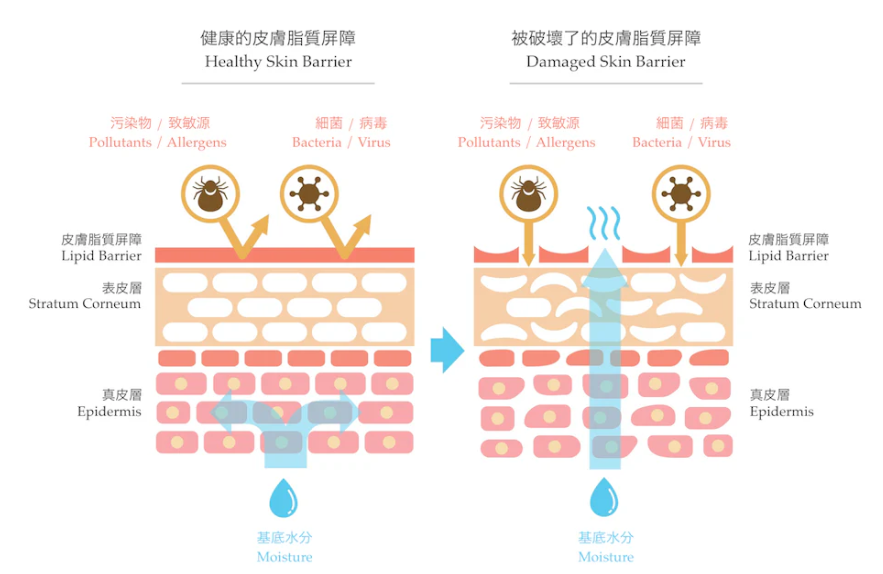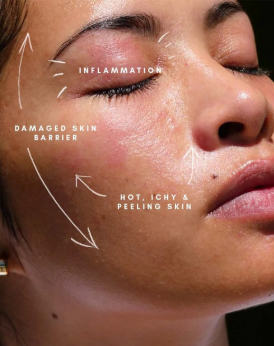Understanding the Skin Barrier: Importance, Protection, and Repair
By Rara, 17 December 2024

The skin barrier plays a crucial role in maintaining the health and vitality of your skin. It is the first line of defense against environmental factors such as pollution, harmful bacteria, and harsh weather conditions. However, in today’s fast-paced world, factors like skincare routines, environmental stressors, and lifestyle choices can weaken this natural barrier, leading to various skin issues. Understanding the importance of the skin barrier and how to protect and repair it is essential for achieving healthy, glowing skin.
In this article, we will explore the functions of the skin barrier, common causes of damage, and effective strategies to strengthen and repair your skin barrier, ensuring that your skin remains in optimal condition.
What is the Skin Barrier?
The skin barrier, also known as the stratum corneum, is the outermost layer of your skin. It is composed of lipid molecules, including ceramides, fatty acids, and cholesterol, that form a protective layer. This layer acts as a shield, preventing moisture loss and protecting the skin from harmful external factors like UV radiation, pollution, and microbial infections.
The skin barrier also plays an important role in maintaining the skin’s pH balance, ensuring it remains slightly acidic. This helps in preserving the skin’s natural microbiome and preventing the overgrowth of harmful bacteria that could lead to acne, eczema, or infections.
A healthy skin barrier is essential for hydration and skin integrity. When compromised, the skin becomes more susceptible to dryness, irritation, redness, and inflammation.
Why Is the Skin Barrier Important?
The skin barrier is essential for maintaining the skin’s health and function. Here’s why it is so important:
1. Prevents Moisture Loss
The skin barrier prevents trans-epidermal water loss (TEWL), which is the process by which moisture escapes from the skin. When the skin barrier is intact, it retains hydration, keeping the skin soft, supple, and smooth. However, a damaged skin barrier can lead to dehydration, resulting in dry, flaky, and tight skin.
2. Protects Against External Pollutants
The skin barrier acts as a shield against environmental pollutants such as dust, smoke, and UV radiation. These pollutants can irritate the skin and contribute to aging, pigmentation, and inflammation. A compromised skin barrier allows these harmful elements to penetrate deeper into the skin, increasing the risk of damage.
3. Maintains Skin’s Natural pH Balance
The skin’s natural pH is slightly acidic, which helps preserve its protective barrier and maintain a healthy microbiome. An intact skin barrier helps regulate this pH, preventing overgrowth of harmful bacteria and fungi that could lead to acne, eczema, or other skin conditions.
4. Aids in Skin Healing and Repair
The skin barrier plays an important role in skin repair. When the barrier is damaged, it hinders the skin’s ability to regenerate and heal itself. A weakened barrier makes it harder for the skin to recover from environmental stressors, leading to increased inflammation, redness, and sensitivity.
🔗Source: Healthline – Skin Barrier Importance
What Causes Damage to the Skin Barrier?
Several internal and external factors can compromise the skin barrier. Some of the most common causes include:
1. Harsh Skincare Products
Overuse of harsh exfoliants, alcohol-based toners, and strong cleansers can strip the skin of its natural oils, weakening the skin barrier. Products with fragrances or irritating chemicals can also cause inflammation and damage the skin barrier, leading to redness and irritation.
2. Environmental Stressors
Pollution, UV exposure, and extreme weather conditions (cold or hot temperatures) can also damage the skin barrier. For example, excessive sun exposure can break down collagen and elastin, causing the skin to lose its strength and ability to protect itself. Pollutants in the air can cause oxidative stress, leading to premature aging and skin damage.
3. Skin Conditions
Certain skin conditions like eczema, rosacea, and psoriasis are often linked to a compromised skin barrier. These conditions make the skin more prone to inflammation, dryness, and sensitivity, and can disrupt the natural lipid layer that keeps the skin protected.
4. Lifestyle Factors
Factors like stress, poor diet, lack of sleep, and dehydration can also weaken the skin barrier. Stress increases cortisol levels, which can lead to inflammation and sensitive skin. A poor diet, particularly one low in essential fatty acids, vitamins, and antioxidants, can hinder the skin’s ability to repair and maintain its barrier.
5. Over-washing and Over-exfoliating
While cleansing and exfoliating are essential parts of a skincare routine, over-washing the skin or exfoliating too often can strip away the skin’s natural oils, resulting in a damaged barrier. Over-exfoliation can also lead to irritation and redness, further compromising the skin’s defense mechanism.
Signs of a Weakened Skin Barrier
A weakened skin barrier can manifest in several ways. Common signs include:
• Dry, flaky skin
• Redness and irritation
• Increased sensitivity
• Itchy skin
• Tight or uncomfortable skin
• Breakouts and acne
• Dull complexion
If you notice any of these symptoms, it may be time to take action and repair your skin barrier.

How to Protect and Repair the Skin Barrier
Conclusion: Prioritize Skin Barrier Health for Radiant Skin
Your skin barrier is essential to maintaining healthy, glowing skin. Protecting it from damage and repairing it when compromise is key to achieving the best results in your skincare routine. By using gentle, hydrating products, incorporating barrier-strengthening ingredients, and adopting a holistic approach to skincare, you can ensure that your skin remains resilient, well-hydrated, and protected.
